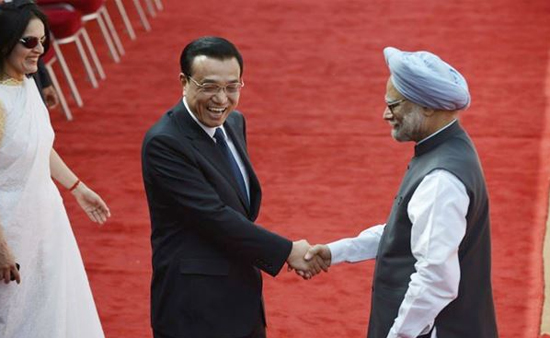
New Delhi, May 20: The Indian and Chinese premiers pledged on Monday to finally resolve a border dispute that has soured ties for decades, saying good relations between the two Asian giants were key to world peace.
Chinese Premier Li Keqiang, making his first foreign visit since taking office, said that Beijing was determined to build up trust with New Delhi as he and a team of ministers signed a series of joint agreements with India.
His host, Prime Minister Manmohan Singh, also stressed he regarded a good bilateral relationship as crucial to the wider region's development.
Li's visit comes after a flare-up last month in a long-running border dispute between the two countries in a remote Himalayan region.
New Delhi accused Chinese troops of intruding nearly 20 kilometres (12 miles) into Indian-claimed territory, triggering a three-week standoff that was resolved when troops from both sides pulled back.
The Line of Actual Control between the nuclear-armed neighbours has never been formally demarcated, although they have signed accords to maintain peace since the border region saw a brief Indo-Chinese war in 1962.
Singh said there was now a mutual desire to finally resolve the dispute and that a joint working group would be established to reach a lasting agreement.
"We agreed that our special representatives will meet soon to continue discussions seeking an early agreement on a framework for a fair, reasonable and mutually acceptable boundary settlement," Singh said after talks with Li.
"Peace and tranquillity on our border has to be preserved," PM Manmohan Singh added at a joint news conference in New Delhi.
Li said the border dispute was a historical hangover and that there was a desire on both sides to overcome it.
"We have established the principles for settling the question," Li said.
"Both sides believe we need to improve the border mechanisms that have been put into place and make them more efficient.. and appropriately resolve our differences.
"The two sides should continue to advance the negotiations on the boundary question and jointly maintain peace and tranquillity in the border area," he added.
Speaking earlier, Li had said that good relations between India and China would "be a true blessing for Asia and the world".
"World peace... cannot be a reality without strategic trust between India and China," he added.
The news conference followed signing ceremonies on a series of issues ranging from agriculture to tourism and trade.
There was also an agreement to resolve a dispute over a Chinese plan to build three more hydropower dams across the cross-border Brahmaputra river, known in China as the Yarlung Tsangpo.
Singh said he had raised Indian concerns about the Chinese activities "on the upper reaches of our shared rivers".
Li is also scheduled to meet foreign minister Salman Khurshid, ruling Congress party leader Sonia Gandhi and senior figures from the main opposition Bharatiya Janata Party before heading Tuesday to India's financial hub, Mumbai.
China is India's second-largest trading partner, with two-way commerce totalling $66.5 billion last year, and the two countries are hoping that figure will reach $100 billion by 2015.
Several major roads in the Indian capital have been closed to prevent Tibetan protestors from disrupting Li's visit, and exile groups have complained of heavy-handed policing in their neighbourhoods.
Police detained three Tibetan protesters near the luxury Taj Palace in the Indian capital where the Chinese premier was staying, an AFP photographer said.
After wrapping up his visit to India, Li is due to travel to neighbouring Pakistan before heading to Switzerland and Germany.






Comments
Add new comment